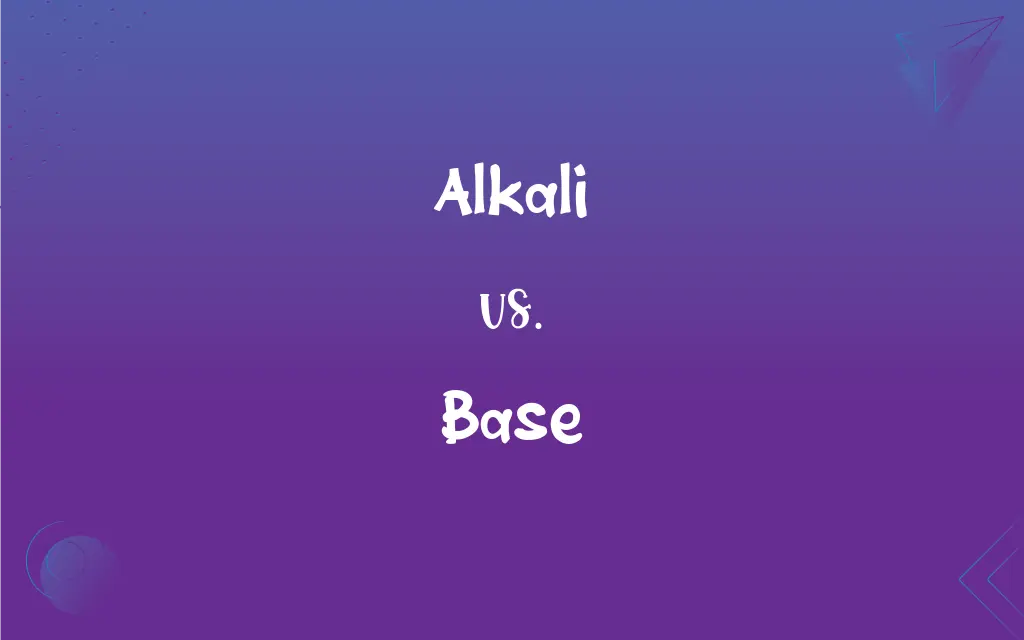Alkali vs. Base: What's the Difference?
Edited by Janet White || By Harlon Moss || Updated on October 23, 2023
Alkali is a water-soluble base; a base can be soluble or insoluble.

Key Differences
Alkali and base are both associated with pH levels and their reaction to acids. An alkali is a specific type of base that dissolves in water to produce hydroxide ions (OH⁻). This dissolution results in a pH greater than 7. On the other hand, a base is a broader term referring to any substance that can accept hydrogen ions or donate a pair of electrons to an acid.
Alkalis and bases play fundamental roles in chemistry. While every alkali is a base, not every base is an alkali. A substance can be a base without having the solubility characteristics of an alkali. For instance, while sodium hydroxide (NaOH) is both an alkali and a base because it dissolves in water to produce OH⁻ ions, aluminum oxide (Al₂O₃) is a base but not an alkali since it doesn't dissolve in water.
In everyday language, alkali often refers to basic substances that are water-soluble. For example, common household substances like baking soda can act as alkalis. On the flip side, the term base encompasses a wider range of substances, soluble or not. An example would be ammonia, which is a base but not an alkali.
It's also important to note that while alkalis always display basic properties, not all bases will exhibit alkali properties. Alkalis have the unique characteristic of being water-soluble, which makes them distinct from other bases. This solubility is what enables alkalis to be especially reactive with acids, resulting in neutralization reactions.
Comparison Chart
Definition
Water-soluble base.
Substance that accepts hydrogen ions.
ADVERTISEMENT
Solubility
Always soluble in water.
Can be soluble or insoluble in water.
Example
Sodium hydroxide (NaOH).
Aluminum oxide (Al₂O₃).
PH Level
Greater than 7 when dissolved in water.
May or may not result in pH greater than 7.
Reaction with Acid
Always neutralizes acids to produce salt and water.
May or may not neutralize acids in the same way.
Alkali and Base Definitions
Alkali
A water-soluble base that produces hydroxide ions when dissolved.
When sodium hydroxide dissolves in water, it behaves as an alkali.
ADVERTISEMENT
Base
A substance that can accept hydrogen ions or donate a pair of electrons.
Ammonia acts as a base by accepting a hydrogen ion from water.
Alkali
A basic substance with a pH greater than 7 in aqueous solutions.
Lime water turns pink with universal indicator due to its alkali nature.
Base
An electron-pair donor.
BF3 reacts with NH3 because NH3 serves as a base, donating a pair of electrons.
Alkali
A member of the group consisting of lithium, sodium, potassium, rubidium, cesium, and francium.
Sodium, found in table salt, is an alkali metal.
Base
A substance that reduces the hydrogen ion concentration in a solution.
Magnesium hydroxide is a base that reduces the acidity in stomach acid.
Alkali
A substance commonly found in household products, like baking soda, which exhibits basic properties.
Baking soda, used in baking, acts as an alkali to neutralize acids in recipes.
Base
The opposite of an acid, typically having a slippery feel and turning litmus blue.
Soap has a slippery feel due to its base properties.
Alkali
A substance that neutralizes acids to produce salt and water.
Potassium hydroxide, an alkali, reacts with hydrochloric acid to form potassium chloride and water.
Base
The starting point or foundation of a substance or argument.
The base hypothesis of the study was that sunlight affects plant growth.
FAQs
How does an alkali differ from a base in terms of solubility?
Alkalis are always soluble in water, while bases can be either soluble or insoluble.
What is an alkali?
An alkali is a water-soluble base that produces hydroxide ions when dissolved.
Is every base an alkali?
No, while every alkali is a base, not every base is an alkali.
Can you give an example of an alkali?
Yes, sodium hydroxide (NaOH) is an example of an alkali.
What defines a substance as a base?
A base is a substance that can accept hydrogen ions or donate a pair of electrons.
How can I determine if a substance is an alkali or just a base?
If the substance is water-soluble and produces hydroxide ions when dissolved, it's an alkali. If it has the ability to accept hydrogen ions without necessarily being soluble, it's a base.
Are alkalis always basic?
Yes, alkalis, being a type of base, always display basic properties.
Do all bases have a pH greater than 7?
Not necessarily. While alkalis will have a pH greater than 7, not all bases will.
How do bases react with metals?
Many bases can react with metals to produce hydrogen gas.
Are alkalis found naturally?
Yes, some alkalis, like lime (calcium hydroxide), are found in nature.
Why is the distinction between alkalis and bases important?
The distinction helps in understanding their properties, solubility, and reactions, especially in chemistry and industrial applications.
What happens when an alkali reacts with an acid?
An alkali neutralizes an acid to produce salt and water.
What is a common household alkali?
Baking soda is a common household alkali.
Is ammonia an alkali or a base?
Ammonia is a base but not an alkali since it doesn't produce hydroxide ions when dissolved in water.
What makes a substance basic?
A substance is basic if it can accept hydrogen ions or donate a pair of electrons.
Are there dangerous alkalis?
Yes, some alkalis like caustic soda (sodium hydroxide) are corrosive and can be harmful.
Why are some bases not alkalis?
Some bases aren't alkalis because they don't dissolve in water to produce hydroxide ions.
Can bases exist in a non-liquid form?
Yes, bases can be solid, liquid, or even gaseous.
Can a substance be both an alkali and a base?
Yes, for example, sodium hydroxide is both an alkali and a base.
Why do alkalis feel slippery?
The slippery feel of alkalis is due to the reaction of the alkali with the natural oils on skin.
About Author
Written by
Harlon MossHarlon is a seasoned quality moderator and accomplished content writer for Difference Wiki. An alumnus of the prestigious University of California, he earned his degree in Computer Science. Leveraging his academic background, Harlon brings a meticulous and informed perspective to his work, ensuring content accuracy and excellence.
Edited by
Janet WhiteJanet White has been an esteemed writer and blogger for Difference Wiki. Holding a Master's degree in Science and Medical Journalism from the prestigious Boston University, she has consistently demonstrated her expertise and passion for her field. When she's not immersed in her work, Janet relishes her time exercising, delving into a good book, and cherishing moments with friends and family.































































